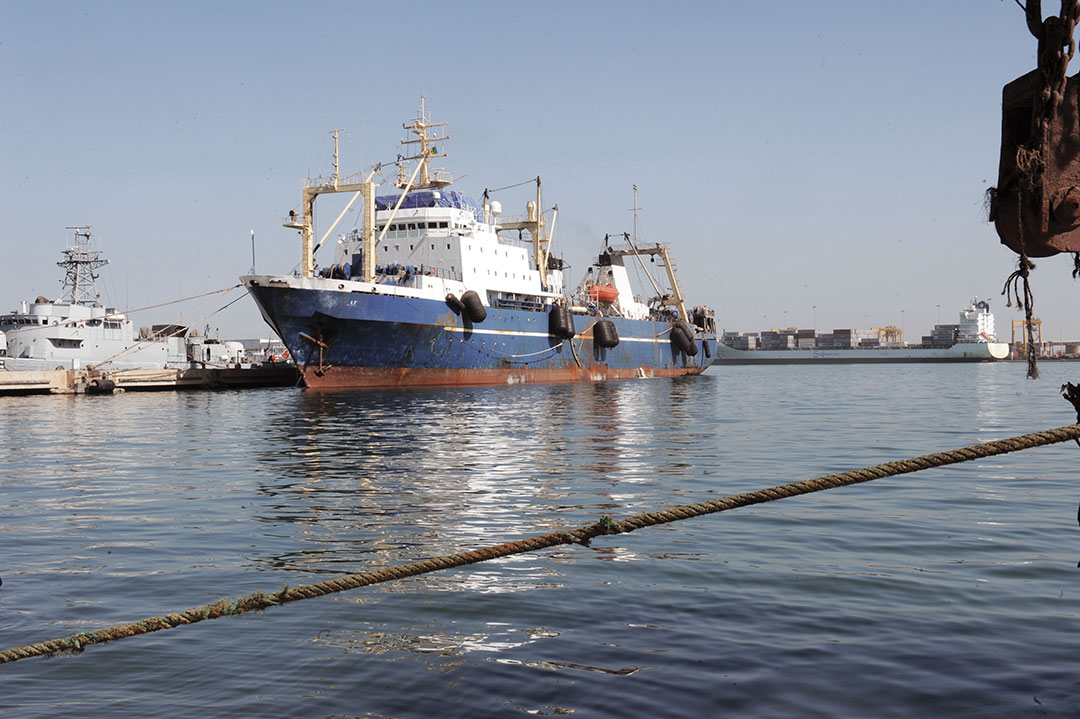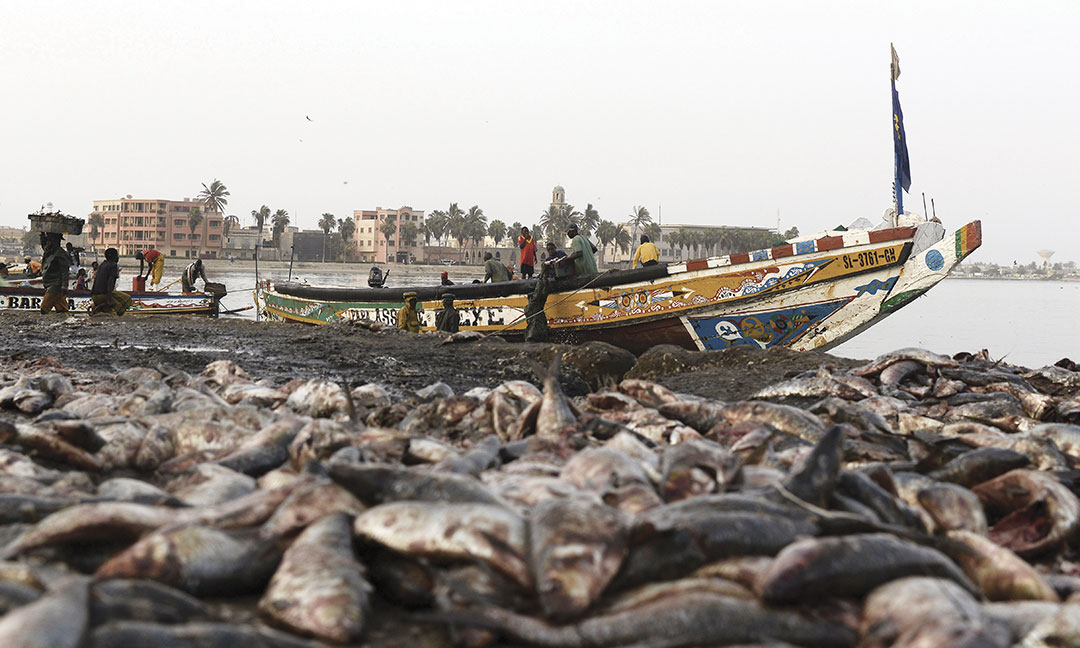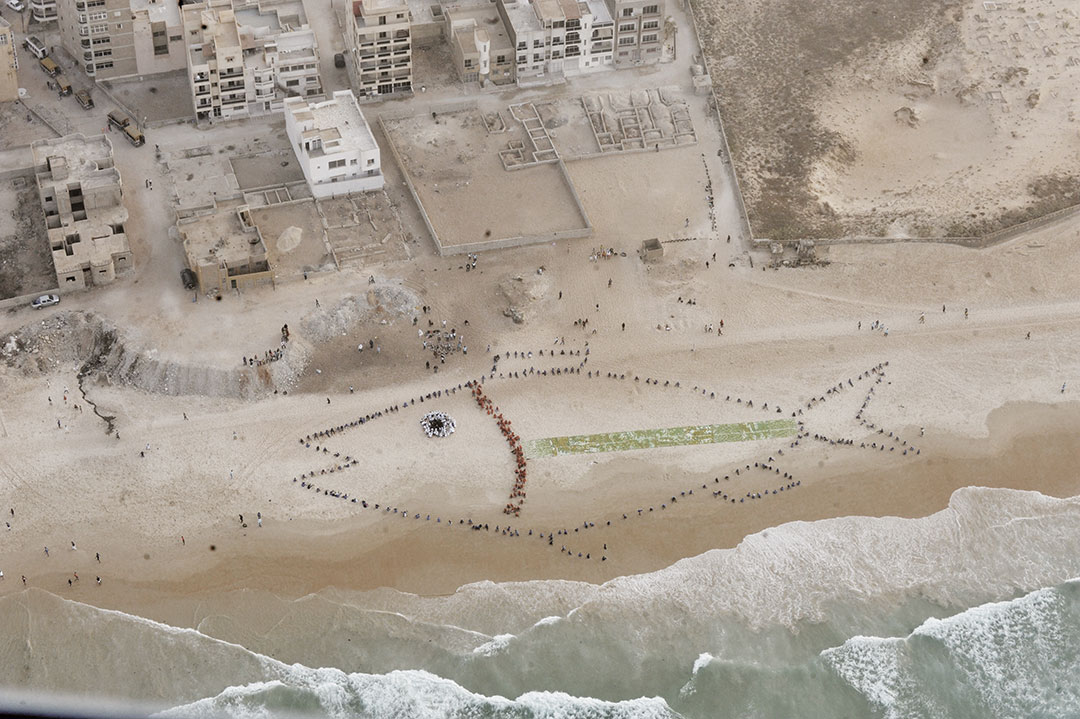Foreign Trawlers are Depleting Africa’s Fish Stocks, but Nations Have the Tools to Fight Back
ADF STAFF
For the Oleg Naydenov, a Russian trawler, the blue waters off the coast of West Africa once were an all-you-can-eat buffet.
The rusted 120-meter vessel and its 82-person crew could haul in and process 18,000 metric tons of fish each year. They paid little attention to the laws in the waters where they sailed, operating without permits.
That changed in 2012 when Senegal strengthened its laws, increased enforcement and raised the maximum penalty for ships caught fishing illegally. In late 2013, French forces conducting aerial surveillance tipped off the Senegalese Navy. They said that the Oleg was fishing in Senegal’s waters near the maritime border with Guinea-Bissau.

Senegalese Navy commandos boarded the ship and escorted it back to port in Dakar, arresting the people on board. Having found 1,000 metric tons of fish in the hold and calling the Oleg a repeat offender, Senegal assessed a fine of $727,000 — double the highest fine possible at the time.
“Today they have understood the message,” Senegalese Fisheries Minister Haidar El Ali told the radio station RFI. “We’re not going to allow pirate ships here. I say ‘pirate’ because it is worse than drug trafficking. These are the people who plunder our resources and turn our fish, which is vital to our food security, into flour to feed their pigs. No, this cannot happen.”
Officials estimate that illegal fishing costs Senegal $272 million per year. The hardest hit are small-scale fishermen who use canoes and have lived off the sea for generations. A ship like the Oleg can haul in as much fish in one week as an artisanal boat collects in a year.
“We are constantly losing out because our resources have considerably diminished, and foreigners are coming to take a share of what we have left,” said Amadou Wade, coordinator for Senegal’s National Federation of Fishing Industry Economic Interest Groups. “We are finding it harder and harder to find fish, and our incomes are suffering.”
Senegal is not alone in fighting the scourge of illegal, unreported and unregulated (IUU) fishing. About 40 percent of the fish caught off the coast of West Africa are taken illegally. The theft costs the region $2.3 billion annually and primarily benefits companies from Eastern Europe, Russia and Asia.
Avoiding Detection
Ending illegal fishing is easier said than done. Criminal fishing crews hunt for weak spots where enforcement is lax. To avoid detection, unscrupulous captains “go dark” by turning off their boats’ transponders, known as the automatic identification system (AIS), so they cannot be traced electronically.
The nonprofit environmental group Oceana examined 20 million instances of vessels turning off their AIS and found numerous cases in marine protected areas where fishing is illegal or tightly regulated. One ship investigated by the group went dark 21 times in 19 months near Gambian waters. The result was 8,000 hours in which the ship’s activity could not be monitored.

“They’re turning off this system in locations around the world that may raise suspicion or warrant further investigation, such as in noted marine protected areas where commercial fishing is prohibited or in developing [countries’] waters that may lack the resources to effectively police their waters,” Lacey Malarky of Oceana told Wired magazine. “It indicates they’re trying to avoid detection and hiding something.”
The fishermen have other tricks to elude enforcement. Some use what are called “flags of convenience.” These are flags offered for a fee by countries that do not check the history of the vessel or its crew. By registering in countries that have little oversight, ships avoid being traced or tightly regulated.
Another common practice is transshipment, in which fish are transferred at sea from a fishing vessel to a refrigerated cargo ship sometimes called a “reefer.” These ships process and deep freeze the catch at minus 28 degrees Celsius and hop from port to port unloading fish and obscuring its origin. A worldwide study of transshipment by Oceana found the waters off the coast of Guinea-Bissau to be a particular hot spot.
Some catches simply are underreported to authorities. This occurs when fishermen lie about the weight of fish caught or mislabel fish species to skirt enforcement. A study by Greenpeace found that Chinese vessels catch 60 percent more fish than they report to authorities. The problem is only getting worse. China’s fleet of fishing vessels has grown rapidly, reaching 2,600 boats in 2016.

“The Chinese government is basically snatching fish out of the nets of poor fishermen in Africa in order to keep fish on plates in China,” The New York Times wrote in an editorial. “Further, many Chinese ships don’t hesitate to break the law to meet soaring demand.”
Experts believe it is time for African countries to beef up enforcement or risk irreparable destruction of their ocean ecosystems.
In a paper published by the Africa Center for Strategic Studies, André Standing, an advisor at the Coalition for Fair Fisheries Arrangements, wrote that 10 times more fish are being pulled out of African waters today than in the 1960s. This overfishing is decimating formerly vibrant ecosystems. “African countries must substantially upgrade their capacity to monitor and prosecute illegal fishing in African waters,” Standing wrote. “Weak accountability of the African fisheries sector enables the ongoing and unsustainable exploitation of this resource.”
Technology
Although illegal fishing trawlers take advantage of countries with limited naval assets or enforcement tools, there is an opportunity to fight back. Data lets countries gain an edge in monitoring, control and surveillance.
The widespread availability of satellite imagery and the requirement that vessels over 300 tons use AIS gives observers huge amounts of information relating to ship activity. By analyzing this data, security forces can deploy resources where they’re most needed.

For example, a high density of AIS signal hits in one area could indicate a boat is slowing down and conducting transshipment to conceal its catch. A boat turning off its AIS may indicate an attempt to conceal action. Officials also can examine a vessel’s time at sea and areas where it fished and compare it to the reported catch to identify underreporting.
FishSpektrum is a tool tracking 1.7 million vessels from 185 nations. Its database includes more than 100 pieces of information on each boat, including current and former owners, flags, operators, insurers, photographs and addresses of people associated with the vessel. Officials also can estimate the intensity of the fishing by tracking gear used and the size of vessels.
It’s a valuable tool but one that must be used in concert with others. Although FishSpektrum does not offer real-time data, another tool called OceanMind does.
In a study by the Overseas Development Institute, authors argued that these private data collection efforts are filling the role that should be played by international organizations. The world needs a central database of vessels known or suspected to be involved in IUU fishing and a universal vessel identification system.
“Ultimately, big data solutions alone will not tackle overfishing or end IUU fishing,” the report’s authors wrote. “Greater political will, improved governance and policy action, anti-corruption efforts, enhanced port measures and improved international coordination are all necessary to tackle these crimes.”
Cooperation
Enforcement is only as good as the weakest regional member. If one country is unable to monitor and protect its exclusive economic zone, the entire region pays the price.
In East Africa, for example, officials found that fishing vessels were falsifying permits from certain countries with weak enforcement and unloading stolen fish in other countries. Illegal fishing had become impossible to trace or stop across a huge 5 million-square-kilometer region.
In response to this, eight nations created a coalition called Fish-i Africa. Its centerpiece is an online platform that lets fisheries enforcement officers cooperate and share information in real time about vessels operating in their waters. The Fish-i system lets countries share identifying and historical data on vessels, whereas previously such requests went through foreign offices and were resolved slowly. Fish-i also offers investigative support, legal opinions and operational advice to members.
“It sends a strong signal to all the operators out there that there is cooperation that is happening amongst the countries of the region and the countries are working together to fight against IUU fishing,” said Roy Clarisse, deputy chief executive of the Seychelles Fisheries Authority. “Now there is no port of convenience where a vessel can go and unload its catch. Because the network is helping to share this information all around.”
An example of the strength of this partnership occurred in Mombasa, Kenya, where a ship called the Greko 1 arrived to unload its catch, as it had been doing for years. Although the ship claimed to have a Somali fishing license, Kenyan fishery authorities used Fish-i to communicate with their Somali counterparts and discovered the permit was fake. Additionally, Fish-i’s technical team inspected the vessel and found that it was using illegal gear and, after photographing it, discovered that it was a salvaged vessel that previously had been scrapped and was illegally brought back into commission.
Other success stories include intercepting a vessel in the Seychelles that had illegally caught $2.5 million worth of fish in Liberia and attempted to present a forged license. By sharing the license with Liberian officials, Seychelles stopped the cross-continental theft.
Fish-i “is the cheapest but most effective method I ever saw anywhere,” said Geofrey Nanyaro, chairman of the nonprofit organization Stop Illegal Fishing. “You know exactly where the illegal operator is, and you know the next move of the illegal operator. Before, it was hunting. You hunted without knowing where you were going to end up with meager resources. Lots of times millions of dollars were used without any results. Now we are getting results almost cost-free.”
How trawlers avoid detection and fish illegally
Falsifying paperwork
Boats fishing illegally present forged paperwork to maritime security officers or port authorities when docking to offload fish. Often this forged paperwork is from a state with weak enforcement capabilities.
Turning off AIS
Vessels greater than 300 tons are required to have an automatic identification system so they can be traced electronically. Illegal operators turn this off to evade authorities.
Transshipment
This is a vessel-to-vessel transfer of cargo, often done at sea. These transfers make the source of the catch more difficult to trace.
Bottom Trawling
Also known as “dragging,” this is when ships pull a net along the ocean floor. The practice damages ocean ecosystems and captures many species not intended for human consumption. It is illegal in many areas.
Underreporting
Some criminal fishing operators underreport the weight of their catch to deceive authorities, skirt limits and avoid taxation. Connected to this practice is misidentifying species to surpass catch limits of valuable fish.
Flying Flags of Convenience
Some vessels purchase the rights to fly the national flag of a country they have no affiliation with. It can be done to avoid oversight of the ship and to obscure the history of the vessel and crew.
What states can do to fight back
Share Information
Partnerships allowing real-time information sharing between states cut down on fraud and help fisheries authorities identify bad actors.
Use Technology
Numerous systems have emerged to let countries track fishing in their waters. One system, FishSpektrum, includes a database tracking 1.7 million vessels from 185 nations with more than 100 pieces of information about each boat.
Work with Seafood Industry
Reputable seafood buyers understand that the long-term sustainability of their industry rests on healthy ocean ecosystems. Industry leaders do not want illegally obtained seafood to enter the market. By working with buyers to help spot illegal seafood and certify their products, bad actors are forced out.
Require Unique I.D. Numbers
All vessels longer than 40 feet should have unique I.D. numbers in a global system preventing them from changing names, flags or other identifiers to avoid oversight.
Target Hot Spots
Although states are responsible for a wide expanse of ocean, it is possible to focus enforcement by examining where most illicit fishing activity takes place. Clues to illegal behavior can be irregular vessel movements, disabling AIS, ships idling next to one another, or a ship’s time at sea not matching its reported catch.
Source: The Pew Charitable Trusts


Comments are closed.